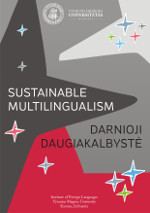IDKM PEDAGOGŲ KOMPETENCIJŲ ANALIZĖ
ANALYSIS OF CLIL TEACHER COMPETENCES
Author(s): Lilija VilkancienėSubject(s): Education, Foreign languages learning
Published by: Vytauto Didžiojo Universitetas
Keywords: Content and Language Integrated Learning (CLIL); CLIL teacher competences; integration; cooperation; commitment;
Summary/Abstract: The success of CLIL (Content and Language Integrated Learning) implementation in different contexts is often related to the development of CLIL teacher competences, as such teachers are not yet specially trained in many countries. CLIL teachers are usually target language teachers, subject teachers or native speakers of the target language who are qualified to teach the non-linguistic subject, in some contexts two teachers work in class in tandems. When it comes to training, a teacher’s competence is often solely determined by their linguistic ability, i.e. the ability to use the target language in class. However, just knowing the target language is not sufficient, as other competences, such as ability to understand how to integrate the subject and language teaching as well as cooperation with other teachers in their school community or other teachers of the same subject are vital. The article aims to overview research into CLIL teacher competences and their effect on teacher’s personality, as well as to discuss different CLIL teacher competence frameworks, such as offered by ECML (2010), CCN (2010) and Mellion (2008). Research in Europe suggests that CLIL teachers face much uncertainty and stress when the language of instruction is changed, which often affects their personalities, teaching methodology and teaching environment, as the ability to use the target language often limits their ability to operate in usual ways in the classroom. Understanding of CLIL pedagogy is by some authors considered as an ability which can compensate lack of linguistic competence. The article aims to point out key competences required by CLIL teachers, based on the frameworks mentioned above, and show their interaction and relationship. In addition, the competences that are essential for CLIL teachers, such as knowledge and skills in the target subject and language, CLIL pedagogy and cooperation, CLIL teachers’ commitment and readiness to devote more time and effort are essential for successful implementation of CLIL.
Journal: Darnioji daugiakalbystė
- Issue Year: 2016
- Issue No: 9
- Page Range: 168-184
- Page Count: 17
- Language: Lithuanian

